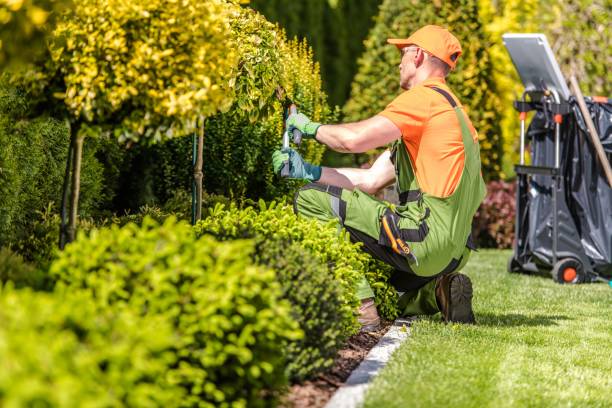“Landscape gardeners” are the professionals who specialize in landscaping. They are experts in the design, installation, and maintenance of beautiful outdoor environments.
The people who work in this industry are referred to as “landscape designers” or “landscape architects,” and they are the ones who are accountable for the design, construction, and maintenance of outdoor spaces such as gardens, yards, parks, and other similar areas.

We will discuss the work that landscape gardeners perform, the education and training that is necessary for them to be successful in the industry, the goods and services that they offer, and the contribution that landscape gardeners make to the world in terms of making outdoor places more aesthetically pleasing and functional.
This article will not fail you if you are interested in learning more about landscape gardening, whether it is to turn your backyard into a calm vacation or simply to satisfy your natural curiosity.
What Is A Landscape Gardener?
A landscape gardener is a specialist who is trained in the planning, building, and maintenance of gardens and other types of outdoor settings. People who possess such a high level of competence are often referred to as “landscape designers” or “landscape architects.”
Landscape designers are responsible for enhancing the esthetic value, functionality, and long-term viability of outdoor areas such as gardens, parks, and even commercial properties.
A day in the life of a landscape gardener can include a wide variety of tasks, some of which include, but are not limited to the following:
- Site Analysis: Assessing the natural features of an outdoor area, such as soil quality, topography, climate, and existing vegetation, to understand the site’s potential and limitations.
- Design: Creating detailed plans and drawings that outline the layout of various elements within the landscape, such as pathways, plantings, water features, and hardscape structures like patios or decks.
- Plant Selection: Choosing the appropriate plant species, considering factors like local climate, soil conditions, and the desired aesthetic effect.
- Installation: Overseeing the construction and planting of the designed landscape, including coordinating with contractors, nurseries, and other professionals.
- Hardscape Design: Incorporating non-living elements like fences, walls, lighting, and outdoor furniture into the overall landscape design.
- Maintenance Planning: Developing strategies and schedules for ongoing care and maintenance of the landscape, including tasks like pruning, weeding, irrigation, and pest control.
- Environmental Considerations: Integrating sustainability principles into landscape design, such as using native plants, water-efficient irrigation systems, and eco-friendly materials.
- Client Collaboration: Working closely with clients to understand their preferences, needs, and budget, and ensuring the final landscape aligns with their expectations.
Landscape gardeners have the potential to work on a broad variety of projects, ranging from individual backyards to public parks and other open areas. In addition to having an eye for design and a knack for gardening, they need to have experience in engineering and building practices.
The objective of the work performed by a landscape gardener is to make outdoor areas more aesthetically pleasing and functional. This may be accomplished by enhancing the social or ecological value of a location, or by doing both.
Whether they are constructing a tranquil personal retreat, a public gathering place, or an alluring corporate campus, landscape gardeners play a vital role in defining our outdoor settings. This is true whether they are planning the space for a public gathering, a personal retreat, or a corporate campus.
How Would You Describe A Gardener?
To put it simply, a gardener is someone who makes a living tending to plants in some sort of outside setting. Plants like flowers, shrubs, trees, vegetables, and even herbs and ornamental grasses are all in a gardener’s wheelhouse.
For them, the key to making their outdoor spaces look good and serve their purposes is ensuring the plants’ health and vitality. An expanded definition of a gardener is as follows:
- Plant Care: Gardeners are responsible for planting, watering, weeding, and fertilizing plants to ensure their growth and overall well-being. They often have a deep understanding of different plant species, their specific needs, and the seasonal considerations that affect their care.
- Landscape Maintenance: In addition to plant care, gardeners may also be responsible for maintaining the overall appearance of the garden or landscape. This includes tasks like mowing lawns, pruning trees and shrubs, and raking leaves.
- Design and Planning: Some gardeners are involved in the planning and design of gardens. They work on layouts, choose suitable plant varieties, and may create garden designs that align with the client’s vision or the garden’s specific purpose.
- Pest and Disease Management: Gardeners are often tasked with identifying and addressing pest infestations and plant diseases that can harm the garden’s plants. They may use organic or chemical solutions to mitigate these issues.
- Knowledge of Soil and Environmental Factors: Successful gardeners have a good understanding of soil quality, drainage, and environmental conditions that affect plant growth. They may amend soil as needed to create an ideal growing environment for plants.
- Equipment and Tool Use: Gardeners use a range of tools and equipment, including shovels, pruners, lawnmowers, and watering systems, to perform their tasks effectively.
- Knowledge of Seasonal Changes: Gardeners are aware of seasonal changes and their impact on plant growth. They may adapt their care routines and plant selection to account for varying weather conditions.
- Client Communication: If working for clients, gardeners often communicate with property owners to understand their preferences and objectives for the garden. They may provide recommendations and updates on garden progress.
- Aesthetic Sensibility: Gardeners have an eye for aesthetics and the ability to create visually appealing outdoor spaces. They may arrange plants and hardscape elements to create harmonious designs.
- Passion for Plants: Many gardeners are passionate about plants and have a genuine love for gardening. They often stay informed about the latest horticultural practices and may continue learning about new plant varieties and gardening techniques.
Professional gardeners may tend to lawns and gardens in homes, public spaces like parks and botanical gardens, or even large businesses. They are vital to the development and upkeep of flourishing gardens and landscapes because of how their labour enhances aesthetics, usefulness, and ecological equilibrium in outdoor settings.
Conclusion
A gardener is a highly skilled specialist whose knowledge and experience are necessary for the care and maintenance of outdoor spaces with vegetation. Enhancing the aesthetic value of outdoor spaces like gardens and landscapes is a part of their job, in addition to growing new plants and taking care of the ones they have already planted.
Gardeners can cultivate the optimal conditions for plant growth because of the knowledge they have of the soil, the components of the environment, and the changes that occur over the seasons.
They use a wide variety of tools and machines to help the property owner accomplish the intended aesthetic and functional goals for the outdoor space. This is done in collaboration with the property owner.
Their enthusiasm for plants and their expertise in gardening enables them to design breathtaking landscapes, which in turn increase our pleasure in spending time outside and contribute to the aesthetic attractiveness of our communities.
Whether they are working in private or public settings, gardeners play an essential part in the preservation and growth of lush and appealing landscapes. This is true whether the gardens in question are public or private.
Thinking of hiring a Gardening Service? Click this guide “gardening help near me” now!
